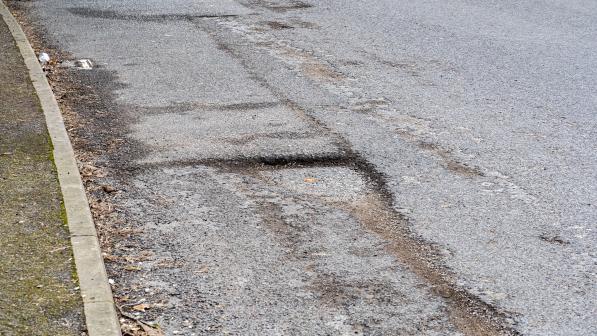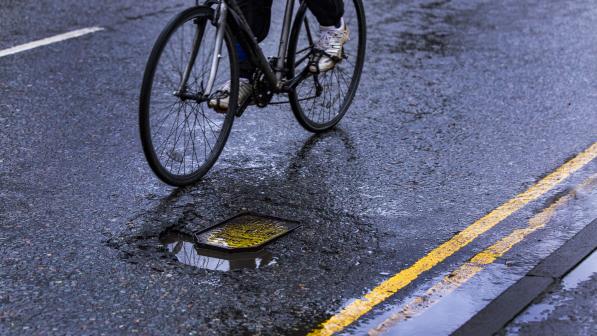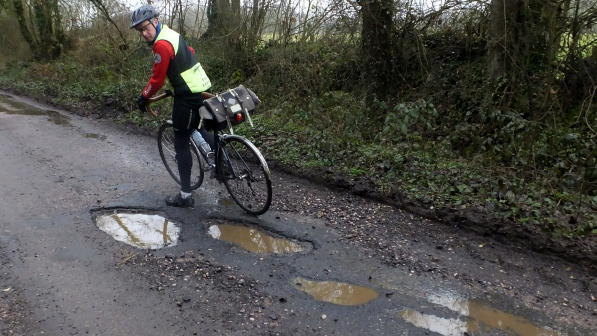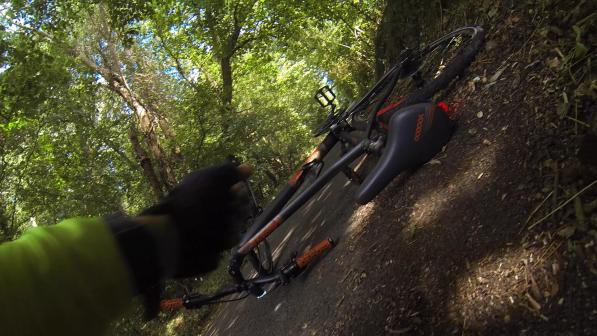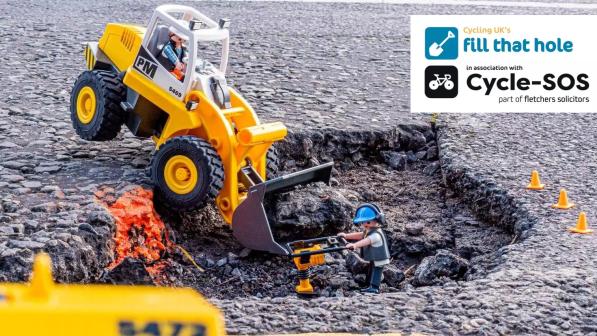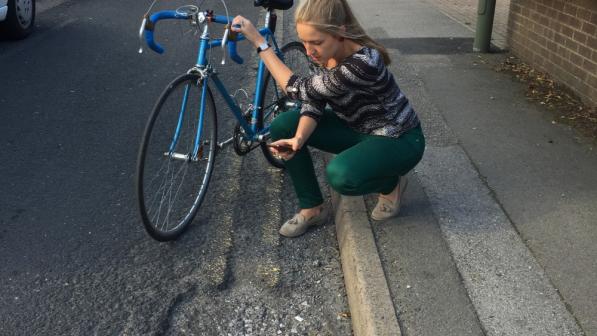More than half of councils have less cash to spend on fixing potholes than five years ago

- Cycling UK’s Pothole Watch campaign runs from 01 to 07 March, highlighting the need for investment in local roads and calling on the public to report road defects
- Only 7% of councils filled every reported pothole within their target time
- As overall highway spending increases, maintenance of local roads, which account for the majority of journeys, is getting left behind
- Latest estimates suggest the cost of fixing England’s pothole problem has risen to £10.4bn
More than half of local authorities in Britain have seen their budget for road maintenance fall in real terms over the past five years, according to research published today by Cycling UK.
The figures, released to mark the national cycling charity’s Pothole Watch campaign, which runs from March 1 to 7, highlight the lack of funding to deal with the ever-worsening state of Britain’s roads, meaning that just one in 14 councils are now able to meet their own target repair times for fixing potholes. The charity is calling on the public to report holes and other road defects they spot while out on essential journeys by using the interactive map on its Fill That Hole website, www.fillthathole.org.uk.
Out of 82 local authorities that responded to Cycling UK’s Freedom of Information requests, just six stated that they repaired 100% of reported potholes within their self-imposed target times over the past five years. One third of councils (27) met their targets less than 75% of the time. The worst performing council was Bristol, which met its target time on just 15% of repairs. Cumbria, West Lothian and Renfrewshire also filled less than half of identified potholes on time.
Out of 112 councils that responded to enquiries about pothole maintenance budgets, 65 (58%) reported a decrease in budget from 2016/17 to 2020/21, when adjusted for inflation.
The most recent data from the Asphalt Industry Alliance (AIA) show that in 2020 it would have cost £10.42bn to bring roads up to standard across England alone – up from £8.99bn the previous year, indicating that the Department for Transport’s road maintenance funding Is not keeping pace with requirements. Meanwhile, the Government is still pushing ahead with its planned £27bn investment in a small number of A roads and motorways, which is currently facing a legal challenge.
With 68% of journeys in the UK being less than five miles, Cycling UK says while local roads are the backbone of our transport network, investment is continuing to stagnate in favour of spending on major routes, with predictable results. As well as causing £1.25bn worth of damage to vehicles each year, potholes put the lives of vulnerable road users in danger: since 2016, 10 cyclist deaths and 178 serious injuries have been attributed to road defects in Great Britain.
“Our findings sadly confirm that government investment in pothole repairs is doing as much good as a sticking plaster on a broken leg,” said Keir Gallagher, the charity’s campaigns manager.
“With a majority of councils seeing their pothole budgets shrinking in real terms over the past five years, it’s time for the Government to commit to ‘levelling up’ the local roads we all use every day, whether we’re walking, cycling, or driving.
“Instead, by investing £27bn in the strategic roads network in England, when less than half of that could fix every pothole in the country, the Government is prioritising a minority of road users and abandoning the rest of us to dangerous pothole dodging every time we leave the house.”
While Cycling UK would like to see proper funding from central government to allow local councils to maintain our roads properly, Mr Gallagher is also calling on the public to do their bit in alerting them to problems in the first place. “On average, there is one defect for every 110 metres of road in the UK. Reporting and getting those potholes fixed by your local authority is easy using the Fill That Hole’s interactive map and app, at www.fillthathole.org.uk.”
ENDS
Notes to editors
- Cycling UK, the UK’s cycling charity, imagines a world where the streets are free of congestion and the air is clean to breathe, where parents encourage their children to cycle to school and everyone shares the exhilaration of being in the saddle. For more than 140 years, we’ve been making our streets safer, opening up new traffic free routes and inspiring more people to cycle more often. www.cyclinguk.org.
- Cycling UK has been running its pothole reporting tool Fill That Hole since 2007, and it is available online and as an app in the Google Play and Apple App Store: www.fillthathole.org.uk.
- Full statistics from local authorities responding to Cycling UK’s FoI requests are attached
- Images can be downloaded at https://www.skyfish.com/p/cyclinguk/1885393.
- Research from Kwik Fit put the cost of vehicle repair bills at £1.25bn in the year to March 2020: https://www.kwik-fit.com/press/cost-of-potholes-rises-to-over-1-billion.
- The six local authorities which filled 100% of reported potholes within their self-imposed target times over the past five years were: Isle of Anglesey (Ynys Môn), Lambeth, Na h-Eileanan Sar, Halton, Hounslow and North Tyneside.
- The 10 worst performing local councils for pothole repairs were as follows:
Local authority
% of potholes repaired within target time
Bristol
15%
Cumbria
43%
West Lothian
43%
Renfrewshire
47%
Barnet
50%
Staffordshire
50%
South Ayrshire
51%
Birmingham
52%
Derbyshire
52%
Bolton
53%
- Press releases specific to Scotland and Wales are attached to this document.
Press contact information
For more information, please contact the national Cycling UK press office. Due to the restrictions caused by the coronavirus outbreak, currently the main press office number (01483 238 315) is not being monitored. If you would like to speak to a member of the press office during working hours (0900 - 1700) please call Rob Kingston on 07880 424 912 or email [email protected]. Out of hours, call 07786 320 713 or email [email protected]
